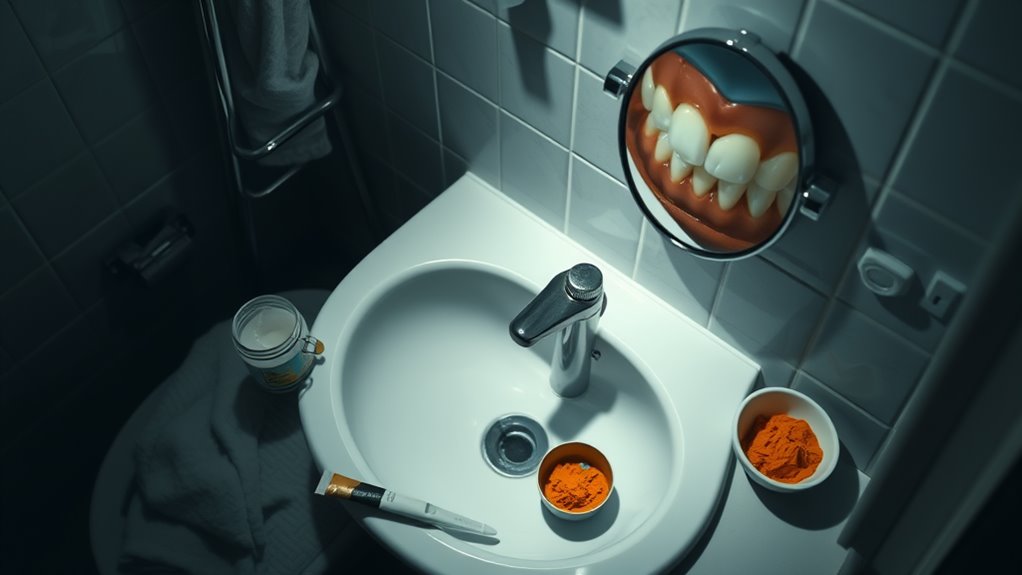Ignoring Tooth Pain Here’s What Could Happen Next!
Ignoring tooth pain can lead to serious complications, including increased sensitivity, chronic headaches, and difficulty chewing. You risk developing infections, which might spread and cause systemic issues, like affecting your heart or lungs. Untreated abscesses can intensify pain and lead to severe infections, posing life-threatening risks. Additionally, neglecting dental issues can disrupt your overall health and quality of life. Want to know exactly what might happen if you ignore these symptoms?
Understanding Tooth Pain: The Warning Signs
When you ignore tooth pain, you’re risking more than just discomfort; it can signal underlying issues that need attention.
Tooth pain often warns you about cavities, gum disease, or even an abscess. You might notice sharp, throbbing, or dull aches, which can vary in intensity.
Sensitivity to hot or cold foods isn’t just annoying; it’s your body telling you something’s wrong. Swelling in your gums or persistent bad breath may also indicate a deeper problem.
If you experience pain while biting down or your tooth appears discolored, don’t brush it off. Recognizing these warning signs early can help you avoid more serious dental issues.
Listen to your body, and don’t hesitate to seek professional help when needed.
Potential Complications of Ignoring Tooth Pain
Ignoring tooth pain can lead to a cascade of complications that extend beyond mere discomfort.
You might first experience increased sensitivity, making it difficult to enjoy hot or cold foods. As the pain persists, you could develop chronic headaches due to tension and stress from the pain.
Additionally, untreated issues can lead to misalignment of your bite, causing further strain on your jaw and teeth. You may also notice difficulty chewing, which can affect your nutrition and overall health.
Moreover, prolonged pain can impact your sleep quality, leading to fatigue and decreased productivity during the day.
Don’t underestimate the importance of addressing tooth pain; it’s not just a minor annoyance but a signal that something may be seriously wrong.
The Risk of Developing Infections
As tooth pain lingers, you considerably increase your risk of developing serious infections. Ignoring that discomfort doesn’t just affect your teeth; it can lead to bacteria spreading throughout your body. This can result in severe health issues that might require more than just dental intervention.
-
You could face gum infections, leading to swelling and abscesses.
-
Sinus infections may arise if bacteria travel through your facial structure.
-
The risk of systemic infections could escalate, affecting your heart or other organs.
-
Chronic infections might develop, requiring extensive treatment and prolonged recovery.
Don’t underestimate the importance of addressing tooth pain. Taking action now can save you from these potential complications and keep your overall health in check.
The Consequences of Untreated Abscesses
While you might think an abscess is just a minor inconvenience, leaving it untreated can lead to serious consequences that affect your entire well-being.
An untreated abscess can grow larger and cause intense pain, making it difficult to eat or even speak. You’re also at risk of the infection spreading to surrounding tissues, leading to cellulitis or even osteomyelitis, which can affect your jawbone.
Additionally, the pus from an abscess can drain into your bloodstream, resulting in sepsis—a life-threatening condition. You may experience fever, chills, and overall fatigue as your body fights the infection.
Ignoring these symptoms won’t make them disappear; instead, they’ll likely worsen, leading to more extensive treatment and higher costs.
Don’t wait—address that abscess!
Impact on Overall Health: Systemic Issues
Tooth pain and untreated dental issues can greatly affect your overall health, leading to systemic complications that extend beyond the mouth.
When you ignore dental problems, you risk developing serious conditions that can impact various aspects of your well-being.
- Increased risk of heart disease due to bacteria entering the bloodstream
- Potential respiratory issues from oral bacteria affecting lung health
- Compromised immune system, making it harder for your body to fight infections
- Diabetes complications, as dental issues can worsen blood sugar control
Taking care of your oral health isn’t just about having a bright smile; it’s about protecting your entire body.
Ignoring tooth pain can have far-reaching effects that you may not even realize.
Importance of Seeking Prompt Dental Care
Ignoring dental pain can lead to more severe problems, making it essential to seek prompt care. When you experience discomfort, it’s your body’s way of signaling that something’s wrong. Delaying treatment can result in complications like infections, tooth loss, or even costly procedures down the line.
By addressing dental issues early, you not only relieve your pain but also prevent further damage that could affect your overall health.
Visiting your dentist regularly helps maintain your oral hygiene and catches potential problems before they escalate. Remember, your oral health directly impacts your overall well-being.
Frequently Asked Questions
Can Tooth Pain Affect My Sleep Quality?
Yes, tooth pain can definitely affect your sleep quality. When you’re in discomfort, it’s harder to relax and fall asleep. You may wake up frequently, leading to restless nights and fatigue during the day.
Is Tooth Pain Always a Sign of a Cavity?
Tooth pain isn’t always a sign of a cavity. It could result from gum disease, tooth sensitivity, or other dental issues. You should consult a dentist to determine the exact cause and get appropriate treatment.
What Home Remedies Can Temporarily Relieve Tooth Pain?
To temporarily relieve tooth pain, try rinsing with warm salt water, applying a cold compress, or using over-the-counter pain relievers. Clove oil can also help. Remember, these remedies aren’t substitutes for professional dental care.
How Can Stress Contribute to Tooth Pain?
Stress can lead to tooth pain by causing you to grind your teeth or clench your jaw. This tension can wear down enamel, create sensitivity, and result in discomfort, making it essential to manage stress effectively.
Are There Specific Foods to Avoid With Tooth Pain?
If you’re dealing with tooth pain, avoid sugary snacks, acidic foods like citrus, and hard items like nuts. These can worsen your discomfort and potentially lead to further dental issues. Focus on softer, less irritating options instead.




